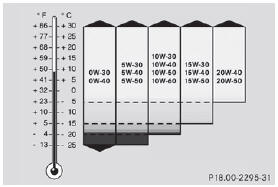 Mercedes-Benz GLK-Class: Engine oil viscosity
Mercedes-Benz GLK-Class: Engine oil viscosity
Viscosity describes the flow characteristics of a fluid. If an engine oil has a high viscosity, this means that it is thick; a low viscosity means that it is thin.
Select an engine oil with an SAE (viscosity) classification suitable for the prevailing outside temperatures. The following table shows the correct SAE classification to be used. The low-temperature characteristics of engine oils can deteriorate significantly, e.g. as a result of aging, soot and fuel deposits. It is therefore strongly recommended that you carry out regular oil changes using an approved engine oil with the appropriate SAE classification.

 Please bear the following in mind
Please bear the following in mind
The engine oils are matched to the performance of Mercedes-Benz
engines and service intervals. You should therefore only use engine oils and oil
filters that are approved for vehicles with mainten ...
 Refrigerant of the air-conditioning system
Refrigerant of the air-conditioning system
The air-conditioning system is filled with R134a refrigerant and a special PAG
lubricant.
Never use refrigerant R 12 (CFC) or mineral lubricants. Otherwise, you could
damage the air-conditioni ...
See also:
Instrument cluster and indicator lights
1. Tachometer.
2. Turn Signal Indicator Light.
3. Seat Belt Warning Light.
4. Supplemental Restraint (AirBag) System Service Reminder Indicator (SRI).
5. Speedometer.
6. Parking Brake/Low ...
Washing the underbody
Chemicals, salts and gravel used for
deicing road surfaces are extremely corrosive,
accelerating the corrosion of underbody
components, such as the exhaust
system, fuel and brake lines, brake ...
Turn signals
High-beam headlamps
ight turn signal
High-beam flasher
Left turn signal
To indicate briefly: press the combination switch briefly to the pressure
point in the direction of arrow 2 ...
